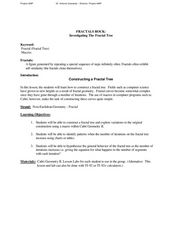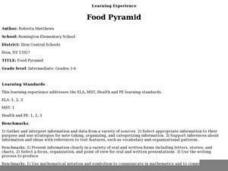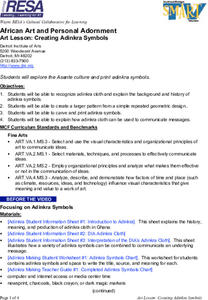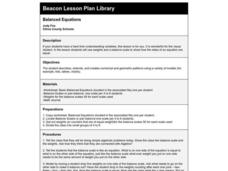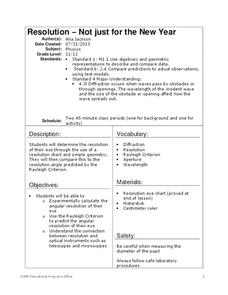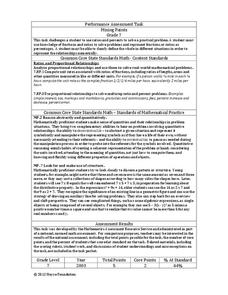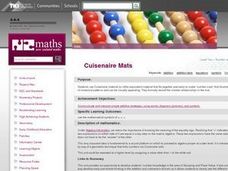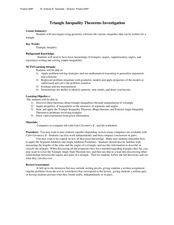Curated OER
The Why and How of General Terms
Sixth graders find the recurrence relation for simple sequences
construct tables of values for a pattern. They find the value of the general term of a sequence algebraically.
Curated OER
Snowflake Curve
Students develop an appreciation for complex structures in nature. They observe patterns in nature in relationship to the Real World. Students use observation skills to assist in problem solving. They show comprehension of the concepts...
Curated OER
Fractals Rock
Students identify the repeated sequences of a pattern. In this geometry lesson, students identify fractals in patterns and nature. They construct a fractal tree and make conjectures.
Curated OER
Food Pyramid - Daily Diet Diary
Students keep a daily diet diary and discuss the Food Pyramid. They investigate other geometric shapes as a way to display daily food guidelines. In groups, they design a menu for the Food Pyramid Restaurant.
Curated OER
Sequences and Exponents
Students practice multiplication sequences and multiplying with exponents. They study how a sequence is a set of numbers which follows a mathematical rule and can be used with all four operations and with combinations of operations.
Curated OER
Properties of Fractals
Students build a working definition of regular fractal, look carefully at the concepts of dimension and scale, and are introduced to logarithms. They solve simple exponential equations for the exponent both by trial and error and using...
Curated OER
Properties of Fractals
Young scholars build a working definition of a regular fractal, they measure the concepts of dimensions and scale, they explore the concept of a logarithm and they attempt to solve simple exponential equations for the exponent both by...
Curated OER
Creating Adinkra Symbols
Students discover examples of adinkra cloth. They explain the history of the symbols themselves. They create a larger pattern using geometric symbols. They discover how the symbols can be used to communicate with one another.
Curated OER
Can Stack
Learners are able to find the rule for summing consecutive numbers;
identify the pattern of triangular numbers. They then solve the given problem using logic and mathematical reasoning.
Curated OER
Manipulative Mania
Students explore tangram vocabulary and tangram designs, creating an art design that contains various geometric parts. They complete a checklist titled, Important Thing About a Quilt Design.
Curated OER
Mondrian, Math, and Amazing Colors
Students study geometric shapes, lines, and the primary colors as they create Mondrian-like art prints.
Curated OER
You Can Count on Squares!
Fourth graders engage in and explore to develop mathematical, specifically algebraic, ideas. Although the tasks are built around measurement, they are algebraic to the extent that they require 'formulae' to be derived form the geometric...
Code.org
Canvas and Arrays in Apps
Scholars learn how to make a digital canvas and fill it with artwork by creating a drawing app using the canvas element. The activity requires learners to previous knowledge of arrays and return commands to draw images.
Curated OER
Balanced Equations
Help your math class understand variables. This activity is for a visual learner. They will use weights and a balance scale to show how the sides of an equation are equal. Worksheet is included.
Inside Mathematics
Magic Squares
Prompt scholars to complete a magic square using only variables. Then they can attempt to solve a numerical magic square using algebra.
Cornell University
Resolution—Not Just for the New Year
Experiment with optical resolution using an inquiry-based lesson. Young researchers calculate fellow classmates' optical resolutions. They apply the information to understand the inner workings of optical instruments.
Ohio Department of Education
Describing and Creating Plane Figures - Grade One
Young mathematicians draw, create, and describe different shapes using triangles. They discuss attributes of the original and created shapes. Pupils classify the created shapes and draw and write in mathematics journals to communicate...
Noyce Foundation
Mixing Paints
Let's paint the town equal parts yellow and violet, or simply brown. Pupils calculate the amount of blue and red paint needed to make six quarts of brown paint. Individuals then explain how they determined the percentage of the brown...
Curated OER
Geometry Gymnastics
Students identify shapes and manipulate 2 and 3 dimensional objects. They view objects from different perspectives and review relative positions (near, far, between). They sing a shape song.
Curated OER
Shaping Up!
Kindergartners are introduced to basic shapes. Learners spend 45 minutes a day in geometry centers carrying out the activities outlined in this ambitious plan. There are games, hands-on activities, interactive websites, art projects,...
Curated OER
Functions
Fifth graders explore mathematics functions. In this functions lesson, 5th graders explore 1 and 2-step functions involving addition, subtraction, multiplication, and division. Students also practice solving problems that their...
Curated OER
Impossible Graphs
Students practice plotting functions on the Cartesian coordinate plane while participating in a discussion about the Possible Or Not worksheet/activity. Students also use the Impossible Graphs worksheet to practice reading a graph,...
Curated OER
Cuisenaire Mats
First graders use Cuisenaire rods to study the mathematical symbols =, <, > for the relationships is equal to, is less than, and is greater than. They use the rods to show visual explanations of common number combinations.
Curated OER
Triangle Inequality Theorems Investigation
Students estimate and measure triangles. In this geometry lesson, students identify the relationship between three sides and a triangle. They use the inequality theorem to decide if a triangle will be formed or not.




